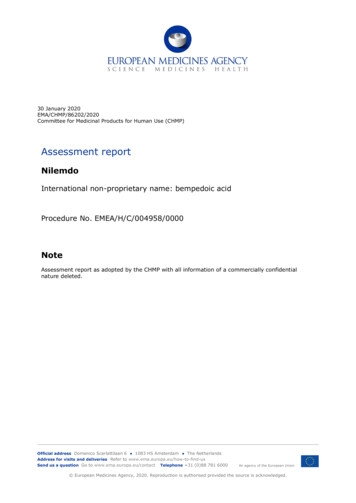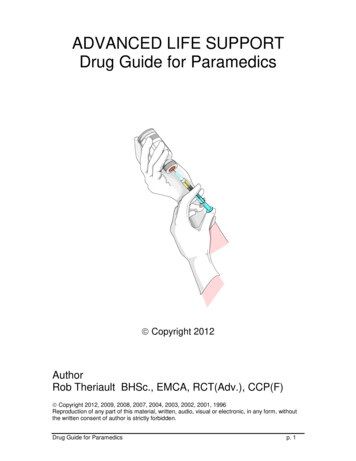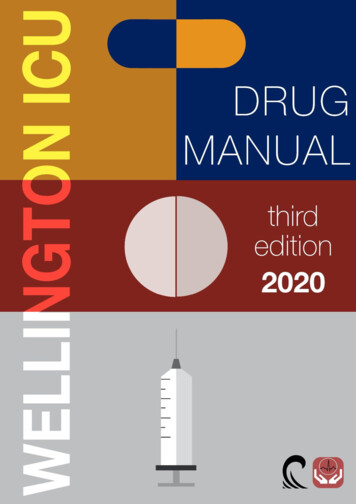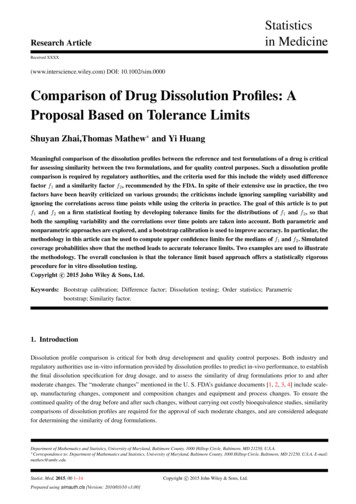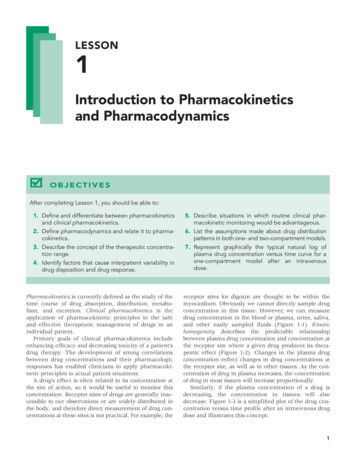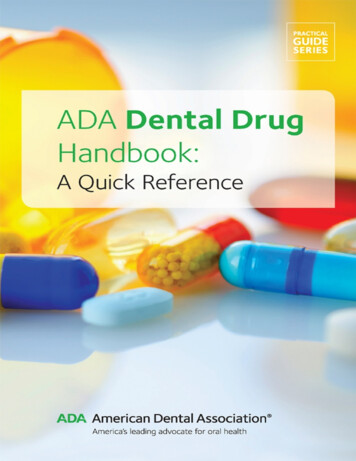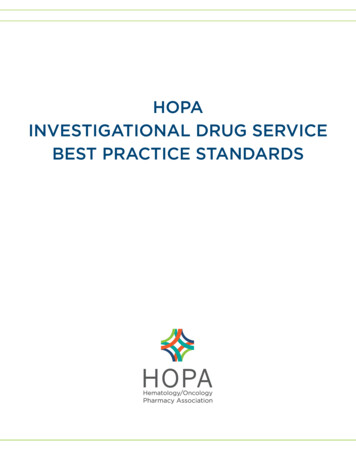
Transcription
HOPAINVESTIGATIONAL DRUG SERVICEBEST PRACTICE STANDARDS
8735 W. Higgins Road, Suite 300Chicago, IL 60631-2738877.467.2791 info@hoparx.org www.hoparx.orgCopyright 2014 Hematology/Oncology Pharmacy AssociationAll rights reserved. No part of this publication may be used or reproduced in any manner whatsoeverwithout written permission except for brief quotations embodied in critical articles and reviews.
EditorBarry R. Goldspiel, PharmD BCPS BCOP*Deputy ChiefNational Institutes of Health Clinical CenterPharmacy Department10 Center Drive, RM 1C240 MSC 1196Bethesda, MD 20892-1196301.496.5869bgoldspiel@nih.govLead AuthorsSapna R. Amin, PharmD BCOPManager, Investigational Pharmacy ServicesDivision of PharmacyMD Anderson Cancer Center1515 Holcombe Boulevard, Unit 376Houston, TX 77030713.563.6646samin@mdanderson.orgAuthorsJorge G. Avila, PharmD BCOPInfusion Services and IDS Pharmacy ManagerDepartment of PharmacyMoffitt Cancer Center12902 Magnolia DriveTampa, FL 33612813.745.1677jorge.avila@moffitt.orgMatthew J. Boron, RPhSenior Clinical Research PharmacistPharmaceutical Management BranchCancer Therapy Evaluation ProgramDivision of Cancer Treatment and DiagnosisNational Cancer InstituteNational Institutes of Health9609 Medical Center DriveRM 5W228 MSC 9725Bethesda, MD 20892240.276.6575boronm@mail.nih.govStefanie Conley, PharmD RPhOncology Investigational Drug Service PharmacistUniversity of Texas Southwestern Medical CenterSimmons Cancer Center-Pharmacy2201 Inwood Road, Suite NC2.852Dallas, TX rn.eduJoyce S. Lee, PharmD BCOP BCPSClinical Pharmacist, IDS/OncologyDepartment of PharmacyAssistant Professor, Division of Hematology/OncologyUniversity of California–Davis Medical Center2315 Stockton BoulevardSacramento, CA 95817916.734.7176joyce.lee@ucdmc.ucdavis.eduRobert Enos, RPh MBAClinical PharmacistDartmouth-Hitchcock Medical CenterNorris Cotton Cancer Center1 Medical Center DriveLebanon, NH 03756603.650.5590robert.enos@hitchcock.orgKathy Galus, PharmD BCOPPhase I Clinical PharmacistInvestigational Drug ServiceRoswell Park Cancer InstituteElm & Carlton StreetsBuffalo, New York a A. Mays, PharmD BS BCOP FASHPDirector, Investigational Drug SectionSouth Texas Accelerated Research Therapeutics (START)4383 Medical Drive, Suite 3046San Antonio, TX 78229210.593.5264theresa.mays@start.stoh.com1 HEMATOLOGY/ONCOLOGY PHARMACY ASSOCIATION
Authors (continued)Gopal Patil, PhD MBA RPhManager, Oncology and Investigational Drug PharmacyUMass Memorial Medical Center55 Lake Avenue NWorcester, MA 01655774.443.8965gopal.patil@umassmemorial.orgPeer ReviewersLinda R. Bressler, PharmD BSClinical Associate Professor EmeritaUniversity of Illinois–Chicago, College of Pharmacybressler@uic.eduMichael P. Kane, RPh BCOPDirector, Oncology Pharmacy Services and ResearchPharmacy Shared ResourceRutgers Cancer Institute of New JerseyRutgers, The State University of New Jersey195 Little Albany StreetNew Brunswick, NJ fer L. Thompson, PharmD BCOP CCRPSenior Clinical Research PharmacistPharmaceutical Management BranchCancer Therapy Evaluation ProgramDivision of Cancer Treatment and DiagnosisNational Cancer InstituteNational Institutes of Health9609 Medical Center DriveRM 5W228 MSC 9725Bethesda, MD r LaFollette, PharmD BCOPClinical Pharmacist Specialist, Hematology/OncologyDirector, Hematology/Oncology PGY2 Residency ProgramGrady Health SystemDepartment of Pharmacy80 Jesse Hill Jr. DriveAtlanta, GA 30303404.489.9182jlafollette@gmh.eduSusan Rogers, RPhDirector, Investigational Drug ServiceEmory University ClinicBuilding A, Suite 12001365 Clifton Road, NEAtlanta, GA 30322404.712.7485sroger2@emory.eduReviewed and endorsed by:Association of Community Cancer CentersInstitute for Safe Medication PracticesOncology Nursing Society*The opinions expressed in this publication are those of the editor and do not necessarily reflect the views of the National Institutes ofHealth (NIH) or the NIH Clinical Center.2 HOPA INVESTIGATIONAL DRUG SERVICE BEST PRACTICE STANDARDS
Executive SummaryThe mission of the Hematology/Oncology Pharmacy Association (HOPA) is to help hematology and oncology pharmacy practitioners and their associates provide the best possible cancer care. The HOPA Investigational Drug Service BestPractice Standards addresses the pharmacist’s crucial role in investigational studies across the life cycle of a protocol, theinvestigational drug service’s roles and responsibilities, and special circumstances related to medication therapy access onprotocols. The document is directed at institutions conducting clinical research in cancer patients; however, the principles and practices are applicable to any setting conducting clinical research that involves medications. Investigationalagents often are considered high-risk or hazardous medications and therefore require consideration for additional safepractices. This guideline should be used in conjunction with other applicable state and federal guidelines.Investigational Drug Service ResponsibilitiesInstitutions conducting clinical trials using investigational medications should establish an investigational drug service (IDS).IDS General Best PracticesThe IDS should develop policies and procedures for investigational medication managementbe responsible for investigational medication inventory maintenance for research protocolsestablish policies and procedures for tracking expiration dates of investigational medicationsuse computer software for investigational medication managementdevelop policies regarding prospective, periodic investigational medication auditsestablish a procedure to assess investigational medications as hazardous agentsdevelop a policy for investigational medications that includes storage, returns, and disposalestablish policies and procedures to perform continuous temperature monitoring and reportingdevelop policies and procedures to establish fees for using the IDSparticipate in sponsor visitscreate a process for coordinating studies across multiple sitesdevelop policies and procedures for mailing investigational medicationsestablish institutional policies and procedures for allowing the use of an investigational medication from anotherinstitution assist the principal investigator with study closeout.IDS Best Practices for Prescribing Investigational MedicationsThe IDS must ensure that protocol information is available to essential pharmacy personnel at the time of prescribing.The IDS should train pharmacy and relevant study team personnel establish and maintain a list of authorized prescribers for each investigational medication create protocol-specific medication order templates for prescribing investigational medications.When computerized physician order entry is used, clinical decision support should be incorporated into electronicinvestigational medication ordering.IDS Best Practices for Dispensing Investigational MedicationsThe IDS should facilitate the dissemination of investigational medication informationestablish policies to ensure adequate investigational medication order review and verificationestablish a process for informed consent verificationestablish investigational medication labeling policiesestablish dispensing and labeling requirements for oral investigational medicationsestablish procedures to dispense investigational medications for single- or double-blind studies.3 HEMATOLOGY/ONCOLOGY PHARMACY ASSOCIATION
IDS Best Practices for Administering Investigational MedicationsThe IDS should identify administration information required by investigational medication sponsors.The Pharmacist’s Role in Investigational Studies Across the Protocol Life CyclePharmacists’ Best Practices for Protocol DevelopmentPharmacists should develop the medication information section for the protocol provide recommendations on supportive care to meet institutional guidelines and provide consistency within andacross investigational studies participate in scientific review committees participate in institutional review board (IRB) protocol reviews review all medication-related information used in the informed consent process.Pharmacists’ Best Practices for Patient Counseling and MonitoringPharmacists should provide medication counseling for patients receiving investigational medications assess medication adherence participate in reporting of unanticipated problems, adverse events, and protocol deviations.The Pharmacy Technician’s Role in Investigational Medication ManagementInstitutions should define a pharmacy technician role for the IDS.Minimum qualifications should be established for pharmacy technicians to practice in the IDS.Pharmacy technicians’ duties should be established to facilitate IDS operations.Expanded Access to an Investigational MedicationThe IDS pharmacist should be familiar with resources used to locate expanded access protocols when other options have been exhausted determine whether the medication manufacturer is willing to make the agent available through a single-patient IND verify U.S. Food and Drug Administration (FDA) and local IRB approval for use of the medication through nonemergency expanded access verify FDA approval and local IRB notification for use of the medication through emergency expanded access be familiar with the FDA and National Cancer Institute websites regarding expanded access.4 HEMATOLOGY/ONCOLOGY PHARMACY ASSOCIATION
IntroductionPharmacists have become an integral part of clinicalresearch trial support in a variety of practice settings,specializing in all aspects of medication therapy management for investigational research protocols. Oncologypharmacists in particular often are involved in clinicalresearch activities and drug development.1 In addition toan increasing number of clinical trials and novel therapiesin oncology, trial designs also have increased in complexity. Early phase, combined-phase, and blinded trialscan require specialized investigational drug service (IDS)procedures.The IDS performs the logistical duties of medicationprocurement and provision of investigational medications.IDS pharmacists often have added roles of protocol reviewand implementation processes that promote patient safety,facilitate regulatory compliance with all state and federalguidelines, and ensure ethical and equitable conduct ofhuman research involving investigational agents. Consistent with their role in advanced pharmacy practicemodels, pharmacy technicians have an important role ininvestigational medication distribution and control.The IDS is charged specifically with providing oversight and direction for the use of investigational medications in research protocols from both an operational and aclinical standpoint. Operational activities include medication acquisition, storage, preparation, dispensing, and disposal; documentation of accountability; and recordkeeping as required by Good Clinical Practices (GCP), the Codeof Federal Regulations (CFR), and any applicable statelaws. Clinical roles include, but are not limited to, institutional review board (IRB) participation (or participation inan equivalent ethical review committee), expert scientificor medication therapy consultation to investigators, andservice as a liaison between the sponsor and the institutional research or pharmacy staff regarding coordinationof protocol-directed medication therapy.The purposes of HOPA Investigational Drug ServiceBest Practice Standards are to discuss the regulatory and guiding principles formedication use in human subjects research describe the role of the pharmacy department,pharmacist, and pharmacy technician in clinicalresearch provide guidance to pharmacists and institutions aboutbest practices for investigational drug management establish and recommend uniform practice standardsdefining the role of a pharmacist or pharmacy servicefor medication management for a clinical researchprotocol.The HOPA Investigational Drug Service Best PracticeStandards was compiled by a working group led by content experts in IDSs. The guidelines were written with afocus on pharmacies that provide investigational medications to cancer patients; however, the principles are applicable to managing all investigational medications. Thesestandards are based on the interpretations of the applicable federal laws, GCP regulations, and current practicestandards for research pharmacists. This document shouldnot be used as a substitute for state or federal regulations;rather, it should be used as a supplement to help establishpractice standards.Regulatory BackgroundIn the United States, regulatory standards concerning theconduct of clinical research are set forth by the Food andDrug Administration (FDA) as established by the CFR.2 AnInvestigational New Drug (IND) application is required bythe FDA to conduct investigational medication research inhuman subjects. IND status permits an unapproved medication or biological product to be shipped lawfully acrossstate lines for the purpose of conducting research. For anymedication or biologic being studied under an IND application, investigators must comply with CFR medicationcontrol regulations. Under certain circumstances, clinicalresearch involving marketed drugs may be considered INDexempt and therefore not subject to IND requirements.3The IDS can be a valuable asset in aiding investigators withmedication information, acquisition, storage, distribution,and accountability for both IND and IND-exempt researchprotocols. In addition to the regulatory standards, theInternational Conference on Harmonisation (ICH) E6 GCPprovides ethical and scientific standards for designing,conducting, recording, and reporting of trials.4IDS operations are contingent upon the following CFRparts and ICH GCP Consolidated Guideline sections: IRBs/independent ethics committees (CFR Title 21 Part56; ICH E6 Section 3) informed consent (CFR Title 21 Part 50; ICH E6 Section4.8 investigator’s responsibilities (CFR Title 21 Part 312.60312.70; ICH E6 Section 4) IND holder’s responsibilities (CFR Title 21 Part 312.50312.59; ICH E6 Section 5).Regulatory compliance can be aided by use of institutional standard processes to establish control and safety.The Joint Commission includes investigational drugs inthe Medication Management Standards, and the American Society of Health-System Pharmacists (ASHP) provides Guidelines on Clinical Drug Research.5,6 IDSs shouldmaintain and adhere to standard operating procedures(SOPs) detailing the proper acquisition, storage, dispensing, labeling, distribution, and disposal of investigationalmedications.5 HEMATOLOGY/ONCOLOGY PHARMACY ASSOCIATION
Investigational Drug ServiceResponsibilitiesInstitutions Conducting Clinical Trials UsingInvestigational Medications Should Establishan IDS.The purpose of an IDS is to support clinical investigators by providing general pharmaceutical review of theprotocol and informed consent, developing investigationalmedication information for study personnel, and obtaining, storing, dispensing, and returning medications usedin clinical research studies. The IDS should be part of theconduct of clinical trials in both the inpatient and outpatient settings. Pharmacy personnel are best suited forproviding comprehensive services; however, an IDS caninclude other research professionals.IDS General Best PracticesThe IDS Should Develop Policies andProcedures for Investigational MedicationManagement.The IDS should coordinate the procurement and dispensingof all investigational and commercial products (sponsorprovided) used in a research protocol. The IDS shoulddevelop SOPs to ensure compliance and consistency withpolicies and procedures. SOPs also allow others to followthe same procedures if the primary IDS staff is not available. The policies and SOPs should include1. Investigational medication inventory controla. Study initiationb. Investigational medication acquisitionc. Accountabilityd. Study closeout2. Storage and handling of investigational medicationa. Safe handlingb. Temperature monitoring3. Preparation and dispensing of investigational medicationa. Labelingb. Blindingc. Protocol compliance4. Investigational medication disposal and destructionor return5. Investigational medication managementa. Transferring investigational medication betweenprotocolsb. Using patient’s own investigational medicationc. Using an investigational medication from anotherinstitution6. Investigational medication shortagesThe IDS Should Be Responsible forInvestigational Medication InventoryMaintenance for Research Protocols.4,7The IDS must be able to account for each dose of medication it receives, dispenses, disposes, transfers to anothersite, or returns to the pharmaceutical sponsor.The IDS is responsible for maintaining adequate levelsof study medication for the duration of the trial. A surveyconducted in 1997 by ASHP8 reported that maintenanceof drug accountability record forms (DARFs) is the servicemost often provided by pharmacies to clinical investigators. The inventory may be maintained on paper; however,an electronic inventory system is recommended.The standard for medication accountability should beconsistent with the information as it pertains to 21CFR312Subpart D and the FDA’s Compliance Guidance Manualfor drug accountability requirements.9 Whenever possible, barcodes should be incorporated into the inventory,dispensing, and administration process.Electronic or paper DARFs should include the following information: name of investigator name of investigative site dispensing location protocol number full protocol title medication name, strength, formulation transaction types–– medication receipt (date, quantity, lot number/medication kit ID), if applicable–– medication dispensing (subject information, date,quantity, lot number/medication kit ID)–– medication transfer, undispensed medicationdisposition (i.e., transfer, return, disposal/destruction) recorder’s initials and date unused, patient-return medication information can becaptured as applicable per institutional policies andprocedures.Sponsor-based DARFs, however, need to meet federalrequirements. DARFs should be maintained in a real-timeenvironment (i.e., each event should be recorded on theday it occurred).The IDS Should Establish Policies andProcedures for Tracking Expiration Dates ofInvestigational Medications.The IDS should maintain a method for tracking expirationor retest dates of investigational medications at its site.Labeling of expiration dates for investigational medicationsis not part of the labeling regulations outlined in CFR Part312. The sponsor is ultimately responsible for providing6 HEMATOLOGY/ONCOLOGY PHARMACY ASSOCIATION
each investigational site the investigational product’s expiration date; however, each site should perform its own duediligence in this area.The IDS Should Use Computer Software forInvestigational Medication Management.Use of IDS computer software offers many advantages, suchas improved safety, efficiency, quality, and compliance.Investigational sites may decide to create their own electronic DARF or purchase one that is commercially available.All software used for investigational drug accountabilitymust meet FDA 21 Part 11 compliance and accountabilityshould be consistent with the information as it pertains to21CFR312 Subpart D and the FDA’s Compliance GuidanceManual for drug accountability requirements.9,10 FDA 21Part 11 guidance requires the investigational site to performits own assessment of each electronic program used in theconduct of the clinical trial. If an electronic system is used,then a down-time procedure should be developed in casethe system is unavailable.Other considerations in the choice of a software package include features related to managing chang
Rutgers Cancer Institute of New Jersey Rutgers, The State University of New Jersey 195 Little Albany Street New Brunswick, NJ 08903-2681 732.235.8236 kanemp@cinj.rutgers.edu Jennifer LaFollette, PharmD BCOP Clinical Pharmacist Specialist, Hematology/Oncology Director, Hematology/Oncology PGY
